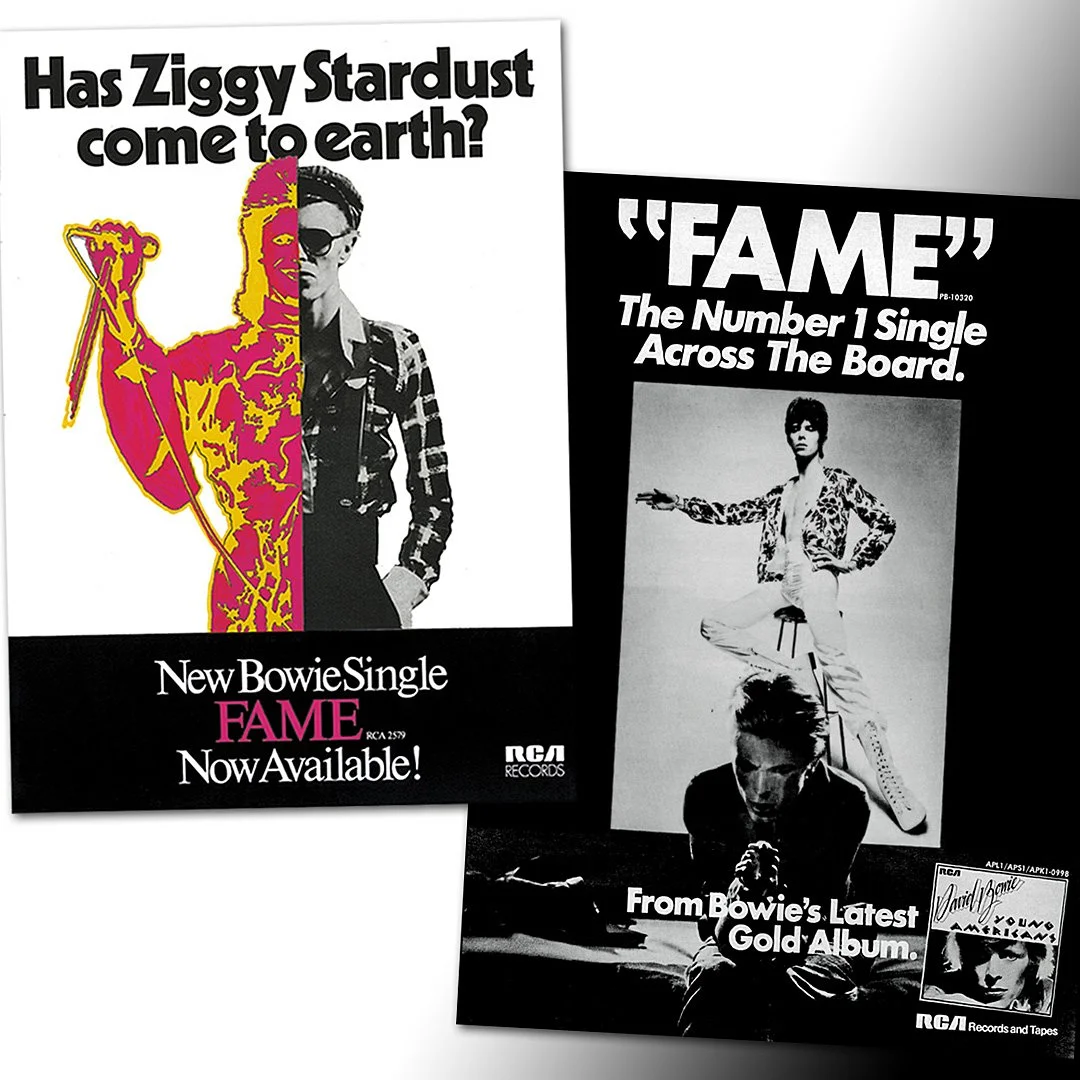“Is it any wonder, you’re far too cool to fool...”
Released in early June 1975 in America, David Bowie’s first #1 in the country was the Bowie/Lennon/Alomar composition, Fame.
It didn’t fare quite so well in the UK, where it was released 50 years ago today, though it was still a top 20 hit.
A side: Fame (Bowie/Lennon/Alomar)
B side: Right (Bowie)
Original UK release date: July 18 1975
Highest chart position: UK: #17 US: #1
Originally appeared on: Young Americans
Produced by: David Bowie, Harry Maslin
Our good friend Jason Draper has written another of his informative and well-researched pieces titled: ‘Fame’: Behind The Bowie/Lennon Co-Write That Debunked The Myth Of Celebrity.
Jason describes the track thus: “A spur-of-the-moment recording with John Lennon, ‘Fame’ drew listeners in with its funky strut but carried a stark warning for anyone seeking the limelight.”
Scroll down to read the full thing.
#BowieFame #Bowie1975 #BowieYoungAmericans
‘Fame’: Behind The Bowie/Lennon Co-Write That Debunked The Myth Of Celebrity
A spur-of-the-moment recording with John Lennon, ‘Fame’ drew listeners in with its funky strut but carried a stark warning for anyone seeking the limelight. By Jason Draper
David Bowie had all but completed his ninth studio album when he began to preview material from it in the closing months of 1974. Pressed to acetate, the seven tracks he’d recorded, for a project he was then calling The Gouster, included the future classic ‘Young Americans’ and a disco-fied reworking of his 1972 tease ‘John, I’m Only Dancing’ (as ‘John, I’m Only Dancing (Again)’). But after playing the songs to John Lennon, Lennon’s then girlfriend, May Pang, and Paul and Linda McCartney at the Sheraton Netherlands Hotel in New York City, where he was lodging in early 1975, Bowie decided that at least one ex-Beatle could make for a key addition to the record. After deciding to lay down a cover of Lennon’s Beatles-era song ‘Across The Universe’, he invited the jaded songwriter to join him for a session which would lead to the impromptu creation of one of Bowie’s greatest songs of the era: an infectious – if scathing – funk number titled ‘Fame’.
Reflecting on the evening five years later, Lennon marvelled at the speed with which Bowie, who’d entered the recording studio with one purpose in mind, ended up achieving an entirely unforeseen objective. “I must say I admire him for his vast repertoire of talent,” Lennon told British radio DJ Andy Peebles in 1980. “I think he’s great. The fact that he could just walk into that and do that. I could never do that.”
The backstory: “I’d had very upsetting management problems”
Although ‘Fame’ seemed to come out of nowhere, its subject matter was rooted in lengthy conversations that Bowie had shared with Lennon in the months prior to its recording. Introduced to Lennon the previous September, while at a party thrown by actress Elizabeth Taylor, Bowie was conscious that the man standing before him, and whom he had namechecked three years earlier in his Hunky Dory song ‘Life On Mars?’, had, after struggling with the demands of “Beatlemania”, spent the last half decade reassessing his priorities as a solo artist. “Don’t mention The Beatles,” Bowie told himself at that first meeting, “you’ll look really stupid.”
Perhaps overcompensating, Bowie’s opening gambit at least made clear his respect for Lennon’s forward-facing attitude: “I’ve got everything you’ve made – except The Beatles.”
During subsequent get-togethers in the bars and clubs of New York City, the pair would trade stories about their experiences with fame – the personal sacrifices made to achieve it, and the dangers of misjudging those who would leech from it. “I’d had very upsetting management problems and a lot of that was built into the song,” Bowie told Q magazine in 1990, admitting that “a degree of malice” was present in ‘Fame’’s lyrics. Together, however, Bowie and Lennon shared a generosity of spirit, and Bowie gratefully received his new friend’s advice that he do away with management altogether.
“I think if you have even just a modicum of intelligence, you’re going to know what it is you are and where you want to go,” he told Performing Songwriter in 2003. “Once you know that, you just bring in specific people for specialist jobs.”
He could have been thinking of Lennon himself when he said those words. Arriving at Electric Lady Studios on 30 January 1975, the former Beatle ended up being a very specific kind of specialist.
The recording: “It all came together so quickly and so brilliantly”
Initially booking the facilities for his recording of ‘Across The Universe’, Bowie realised he had a rare chance to create something new with Lennon, who’d agreed to add rhythm guitar to the cover because, as he would tell Melody Maker a little more than a month later, “I’d never done a good version of that song myself.” After dispatching ‘Across The Universe’ with minimum fuss, Bowie decided to take the chance “by the horns”, as he put it, and approached Lennon with his pitch: “Let’s write something!”
As Bowie’s lead guitarist and future bandleader Carlos Alomar began playing with a riff he’d worked up for live performances of The Flares’ 1961 R&B cut ‘Foot Stomping’ – a nightly part of Bowie’s Soul Tour of late 1974 – Lennon started singing the word “fame” on top, and Bowie retired to the control room to write lyrics. Drawing on his recent discussions with Lennon and on his experience with the management team he was in the process of leaving, Bowie began to list the reasons why he felt “fame itself” was “not a rewarding thing”: “What you get is no tomorrow”, “What you need you have to borrow” he noted before summing up the cutthroat nature of the entertainment industry with a question: “Is it any wonder I reject you first?”
Embracing the moment, Bowie, Lennon and Alomar pieced the song together at breakneck speed. “It all came together so quickly and so brilliantly,” Bowie later explained. “It was an incredibly intoxicating time.” “We just sort of – oh, boom, boom, boom – like that,” Lennon said elsewhere. “It wasn’t like sitting down to write a song. So we made this lick into a song is what happened.”
Capturing the destabilising nature of celebrity – what Bowie would describe to Musician magazine as the realisation that fame “isn’t everything it should have been” and that living in the public eye is “like not having a life of your own any more” – producer Harry Maslin and studio engineer David Thoener manipulated the tapes in order to warp the sound of the song. After asking Lennon to hold a specific piano chord for as long as he could, Maslin flipped the multitrack upside down, to give ‘Fame’’s opening seconds a backwards-sounding effect (“The Beatles never did it that way,” Lennon teased). For his part, Thoener slowed the tape down when recording Lennon’s “Fame” vocal retorts, leading them to take on a mockingly high pitch when the tape was played back at the correct speed. Reflecting on Lennon’s crucial touch, Bowie would tell Melody Maker, “It was more the influence of having him in the studio that helped. There’s always a lot of adrenalin flowing when John is around… The riff came from Carlos, and the melody and most of the lyrics came from me, but it wouldn’t have happened if John hadn’t been there. He was the energy, and that’s why he’s got a credit for writing it; he was the inspiration.”
The release and legacy: “Of course David Bowie had funk!”
Running to a little more than four minutes, ‘Fame’ was a hypnotically funky song that neatly encapsulated Bowie’s caustic view of the celebrity lifestyle while also further developing the “plastic soul” sound he’d worked up in Philadelphia’s Sigma Sound Studios the previous summer, when he’d recorded the Gouster material he’d first played to Lennon at the Sheraton Netherlands Hotel. So enthused was Bowie by the results of his Lennon collaboration, he immediately rethought the entire album, making space for both new recordings and promoting the song ‘Young Americans’ to the status of title track. Placed at the album’s end, ‘Fame’, with its cocksure strut and taunting closing lines – “Fame/What’s your name?” – was an unavoidable earworm that stuck in listeners’ heads long after the fade.
Building on the success of ‘Young Americans’, which had given Bowie his breakthrough US hit in May 1975 when it peaked at No.28, ‘Fame’, issued as the second single from its parent album, topped the Billboard Hot 100 in June, scoring Bowie his first stateside No.1. (Released in the UK on 18 July, the single would go Top 20 in Bowie’s homeland.) Confirming his status as a crossover star capable of reaching rock and soul audiences, the song caught the attention of “The Godfather Of Soul”, James Brown, who, perhaps nodding to Carlos Alomar’s stint in his own band during the late 60s, based his December 1975 single, ‘Hot (I Need To Be Loved, Loved, Loved, Loved)’, almost entirely on the track.
At the vanguard of a whole other funk movement, George Clinton name-checked Bowie on ‘P. Funk (Wants To Get Funked Up)’, the lead track from Mothership Connection, the career-making album by his group Parliament. Speaking to FADER four decades on from its release, Clinton, whose own music would be treated as a foundational source for hip-hop, acknowledged that ‘Fame’ had had a direct influence on Mothership Connection, particularly the album’s US Top 20 hit ‘Give Up The Funk (Tear The Roof Off The Sucker)’. “I was biting off David Bowie,” he admitted. “‘Faaaame!’ ‘Weeeeee want the funk!’… I just added the silent parts that he didn’t say. It’s the same feel. Of course David Bowie had funk! You don’t know David Bowie if you ask whether he had funk.”
Bowie himself would use ‘Fame’ for parts when it came to revisiting his own work for the hits-based Sound+Vision Tour of 1990. Remixed as ‘Fame 90’, this updated take went Top 30 in the UK and gave Bowie the chance to consider the song’s impact in an entirely new era. “It covers a lot of ground, ‘Fame’,” he told Q magazine. “It stands up really well in time. It still sounds potent. It’s quite a nasty, angry little song. I quite like that.”
Buy the ‘Young Americans’ 50th-anniversary vinyl reissues and merch at the David Bowie store.

